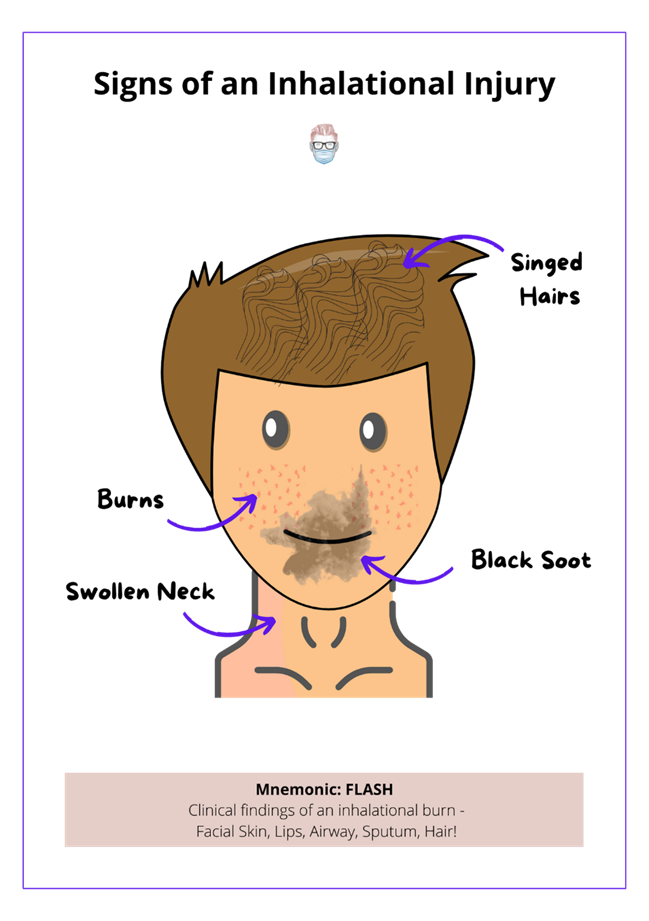A nurse working in an emergency department is performing triage. To which of the following clients should the nurse assign priority?
A client who reports night sweats and fever for the last week
A client who has compound fractures of the tibia and humerus
A client who reports severe vomiting and diarrhea
A client who has soot markings around each naris following a house fire
The Correct Answer is D
a. A client who reports night sweats and fever for the last week:
Night sweats and fever can be indicative of various underlying conditions, including infections. While these symptoms may require medical attention, they do not necessarily indicate an immediately life-threatening condition compared to other options.
b. A client who has compound fractures of the tibia and humerus:
Compound fractures involve broken bones that penetrate through the skin, leading to a risk of severe bleeding, infection, and other complications. This client's injuries are significant and require immediate attention to prevent further complications and provide pain management and stabilization.
c. A client who reports severe vomiting and diarrhea:
Severe vomiting and diarrhea can lead to dehydration, electrolyte imbalances, and other complications, especially if prolonged or accompanied by other symptoms such as fever. While this client requires prompt assessment and treatment, the urgency may not be as high as for other conditions.
d. A client who has soot markings around each naris following a house fire:
Soot markings around the nares (nostrils) suggest inhalation injury, which can lead to airway compromise, respiratory distress, and other serious complications. This client requires immediate assessment and intervention to ensure airway patency, oxygenation, and respiratory support.

Nursing Test Bank
Naxlex Comprehensive Predictor Exams
Related Questions
Correct Answer is ["C"]
Explanation
a. The AP wears a surgical mask when caring for a client who has respiratory tuberculosis.
Incorrect. AP should wear an N95 Maskwhen caring for a client with respiratory tuberculosis helps prevent the spread of airborne pathogens, protecting both the healthcare worker and others in the environment.
b. The AP uses alcohol-based hand sanitizer after emptying the bedpan of a client who has Clostridium difficile.
This action is incorrect. Alcohol-based hand sanitizers are not effective against the spores of Clostridium difficile. Handwashing with soap and water is necessary to effectively remove the spores.
c. The AP bundles the client side of linen inward when changing the sheets for a client who has an infected surgical wound.
When handling soiled linen, it is essential to fold the client side of the linen inward to minimize the spread of contaminants. This helps to ensure that any contaminated surfaces do not come into contact with other surfaces, which is crucial for preventing the spread of infection.
d. The AP removes her gloves before leaving the room of a client who has MRSA.
For MRSA (Methicillin-resistant Staphylococcus aureus), the AP should remove gloves and perform hand hygiene before leaving the room.
Correct Answer is B
Explanation
a. Advise him to complete less time-consuming tasks first:
This intervention may be helpful in prioritizing tasks and ensuring that essential care is provided in a timely manner. However, it does not address the underlying issue of difficulty focusing and may not address the root cause of the problem.
b. Recommend that he take time to plan at the beginning of his shift:
Planning at the beginning of the shift is essential for organizing tasks and prioritizing care. This intervention may help the newly licensed nurse improve their time management skills and focus by providing a structured approach to their work.
c. Offer to provide care for his clients while he takes a break:
While taking breaks is important for maintaining focus and preventing burnout, offering to provide care for his clients may not address the underlying issue of difficulty focusing and completing tasks. Additionally, taking over his tasks may not encourage the newly licensed nurse to develop the skills needed to improve his performance.
d. Ask other staff members to take over some of his tasks:
Asking other staff members to take over some of his tasks may provide temporary relief, but it does not address the underlying issue or help the newly licensed nurse develop the skills needed to improve his performance.
Whether you are a student looking to ace your exams or a practicing nurse seeking to enhance your expertise , our nursing education contents will empower you with the confidence and competence to make a difference in the lives of patients and become a respected leader in the healthcare field.
Visit Naxlex, invest in your future and unlock endless possibilities with our unparalleled nursing education contents today
Report Wrong Answer on the Current Question
Do you disagree with the answer? If yes, what is your expected answer? Explain.
Kindly be descriptive with the issue you are facing.
